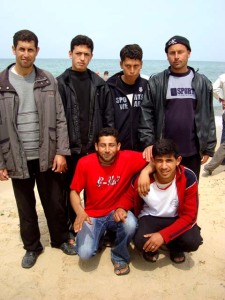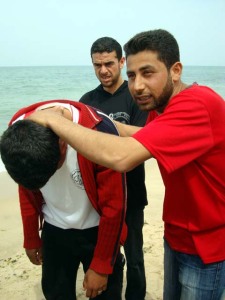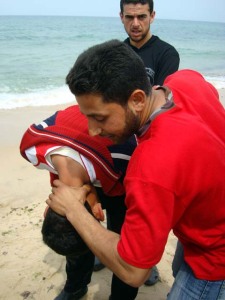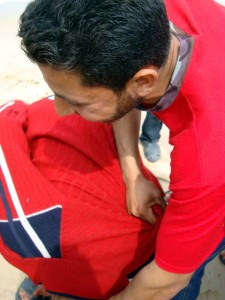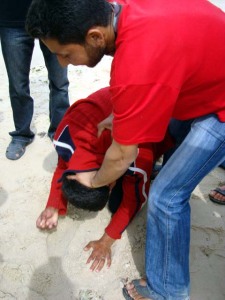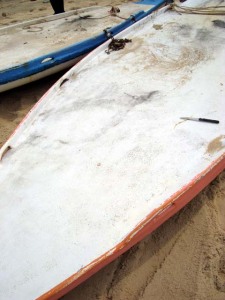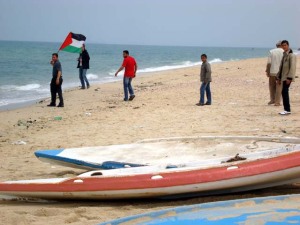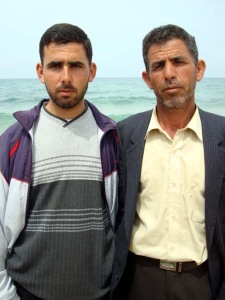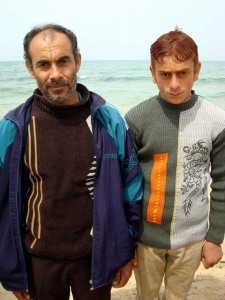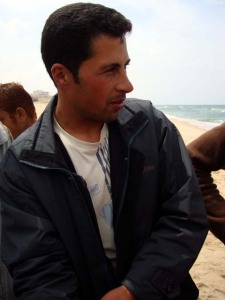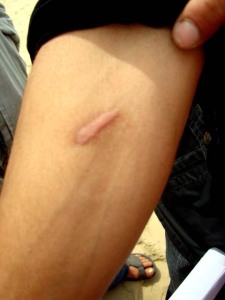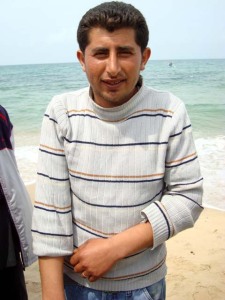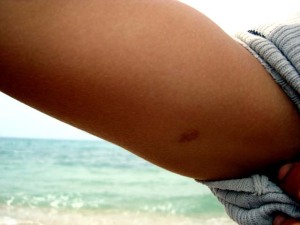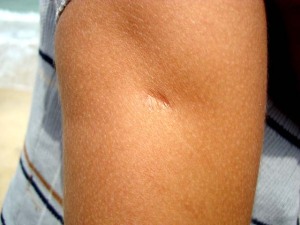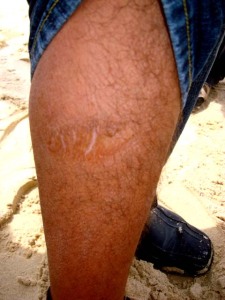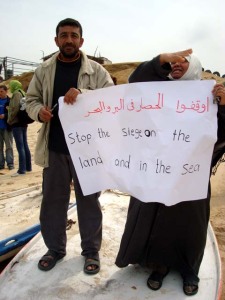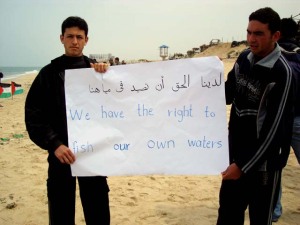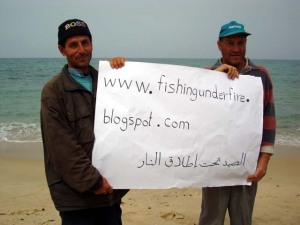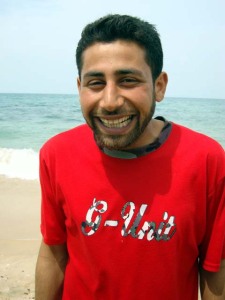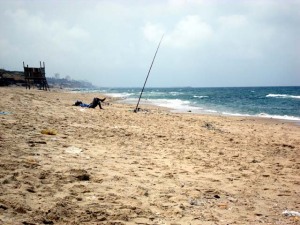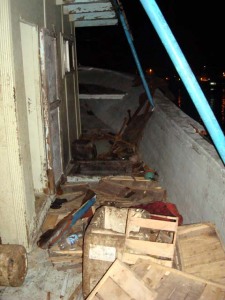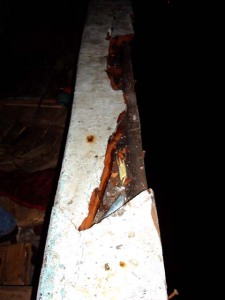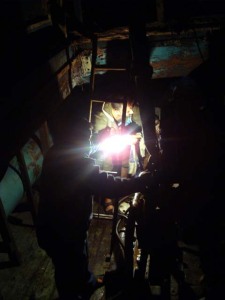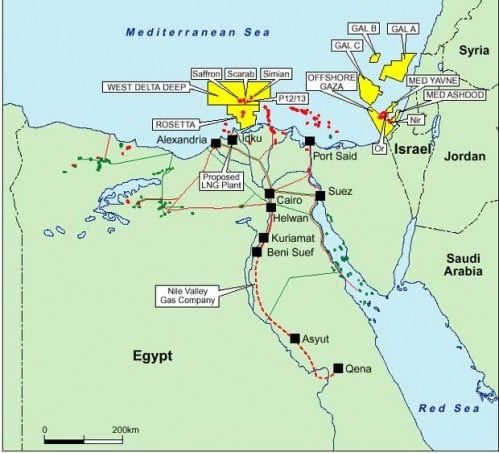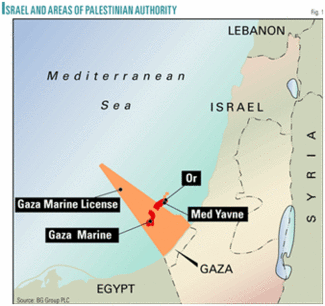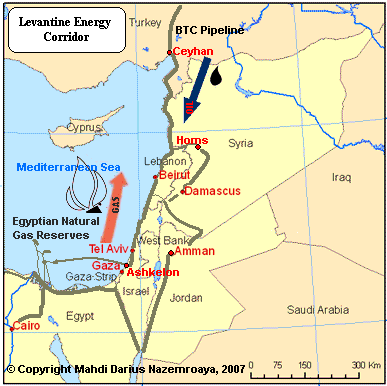Filed under: fishing under fire
*6 fishermen from the Beit Lahia region who were abducted while fishing just 200m off of Gaza’s coast on March 19, their boats thieved, by Israeli naval soldiers patrolling less than 1 km from Gaza’s coast.
In one of the latest acts of aggression against Palestinian fishermen fishing well-within their internationally-recognized legal limits of 20 nautical miles, on April 21st, the Israeli gunboats patrolling as close as a few kilometers off of Gaza’s coast abducted 4 more Palestinian fishermen and their 2 small ‘hassaka‘ fishing boats, bringing the known number of abducted fishermen -taken while fishing in their own territorial waters -to at least 28, and stolen fishing boats to 13, with at least 5 fishermen known to have been injured at sea.
The International Solidarity Movement (ISM) -Gaza Strip has been monitoring Israeli naval attacks on Palestinian fishermen and theft of fishing boats, nets, and equipment since August 2008, although Israel’s policy of bullying and even killing Palestinian fishermen goes back nearly a decade. Through video footage and photos taken from on-board fishing boats being attacked by much larger, faster, and militarily-equipped Israeli naval boats, ISM-Gaza has documented many of these attacks.
Further documentation comes in the form of fishermen’s testimonies and inspection of damaged fishing boats. All of the reports and related news items can be found at Fishing Under Fire , including a Partial list of major attacks against Palestinian fishermen, found along the right side of the website.
Skimming the list, it quickly becomes clear that the violations against Palestinian fishermen are really occurring on a daily and bi-daily basis, including the theft of their fishing boats.
6/4/2009: 8 fishermen abducted, 4 boats stolen
3/4/2009: 1 fisherman wounded, at least 3 boats hit by gunfire
1/4/2009: Several boats hit by gunfire
25/3/2009: 4 fishermen abducted, 1 boat stolen
23/3/2009: 1 fisherman wounded
19/3/2009: 6 fishermen abducted, 3 small boats stolen.
18/3/2009: 2 fishermen abducted, 1 small boat stolen.
17/3/2009: 1 fisherman seriously wounded by live amunition.
13/3/2009: 4 fishermen abducted, 2 small boats stolen.
14/2/2009: 1 fisherman seriously wounded by live amunition, several boats hit by gunfire. [1 , 2]
6/2/2009: 1 fisherman wounded by live amunition
27/1/2009: Boat “sprayed” with bullets.
26/1/2009: 1 fisherman wounded by live amunition.
22/1/2009: 7 Palestinians including 5 fishermen wounded by shelling.
17/12/2008: 1 fisherman abducted, boat stolen
The categories of blog entries are also telling: boat hit by gunfire, boat hit by shell, boat rammed, fishermen abducted, fishermen wounded, fishermen tortured, water cannon attacks, Israeli attacks during ceasefire…
In David K. Schermerhorn’s April 2009 very detailed Timeline of Gaza Marine Zone, Fishermen and Natural Gas Deposits he outlines not only the history of Israel’s policy of piracy and preventing of Palestinian fishermen from accessing their own territorial waters, but also brings to light the connection between Israel’s trawling for Gazan natural gas deposits and the aggressing of Palestinian fishermen.
Schemerhorn’s timeline renders transparent Israel’s ambitions for Palestinian natural gas and Israel’s determination to, at all costs, go after it.
Michel Chossudovsky’s January 2009 article, War and Natural Gas: The Israeli Invasion and Gaza’s Offshore Gas Fields, likewise outlined just how significant the gas is to Israel and, with respect to the ruthless 3 week war on Gaza, to just what extent Israeli decision-makers would war for it.
While Israel’s full-scale war has stopped, Israeli air, land and sea attacks continue. Drones still audibly patrol Gaza’s skies, Israeli warplanes still fly loudly over Gaza’s cities and camps, and shelling from Israeli naval boats occurs on a daily basis, with shooting from the sea and border zones almost as regular.
On April 2nd, Palestinian fishermen from the northern region of Beit Lahia protested the continuing attacks on and abduction of fishermen. Many of those protesting had themselves been injured and/or abducted by Israel naval soldiers, their boats stolen, nets cut.
Most abducted fishermen corroborate their accounts of being forced to strip, jump into cold water, swim for over 50m, and be hauled out by Israeli naval soldiers who then handcuff and blindfold their abductees.
Fishermen in the hassakas, closer to the coast, are made to jump in the sea and swim to a waiting Israeli naval boat while another Israeli naval boat cuts the lines of the fishermen’s nets.
Anis Mohammed Sultan (20) was among 6 fishermen abducted by the Israeli navy on March 19 when under 200m out from Gaza’s coastline.
Sultan says that Israeli soldiers in small navy crafts approached their hassakas, just roughly 150m out, and ordered them to strip naked and jump into the sea. The rest of their detention followed what seems to be Israeli procedure: handcuffing and blindfolding, abducting to an Israeli port or location, interrogation for over 12 hours, and release at Erez crossing, without money, belongings, or fishing boats.
ISM Gaza took a detailed testimony of one such interrogation, during which questions ranged from the fishermen’s salaries to the whereabouts of Gilad Shalit to whether the fishermen would work as collaborators with Israeli intelligence, with incentives such as the privilege to fish in Gazan waters. [see testimony below]
According to Sultan, his interrogation included this type of questioning and probing, lasting from his detention at 5am to his release at 8pm at Erez crossing.
When he asked for the return of his fishing boat, the Israeli authorities holding him refused.
Mahmoud Mohammed Zayid (23), one of the 5 others kidnapped with Sultan, in addition to the same sort of interrogation as Sultan’s, was questioned about a “Mohammed Zayid”, the name of both his father and his brother, his interrogators accusing him of lying about the name of his father.
One week prior, on March 13th, Zaki Mustafa Tarrosh (44) was abducted while fishing just 10m out with his teenage son Ismail Zaki Farrosh (16). The father of ten said that three Israeli navy boats approached their small hassaka. One naval boat came to arrest them, Tarrosh said, and a second arrested father and son Thaer Mahmoud Yousef Zayid (45) and Nidal Thaer Mahmoud Zayid (23) fishing nearby. A third Israeli naval boat cut both fishing nets.
“They took our boats, sunk our nets, and took our phones. We have no other nets to use. I’ve got 10 children to feed,” Tarrosh said.
Thaer Zayid said that since his house was destroyed in Israel’s war on Gaza the nine members of his family have been living in a tent in the Al Attatra beach camp near Beit Lahia coast.
He is adamant about the necessity to fish, to access Palestinian waters. “Whatever food aid they give to us will never be enough to replace our work and what we earn from it.”
“When we aren’t taken or shot at by Israeli soldiers, we work from 5am-4pm and earn about 30 shekels.” It isn’t a lot, by any means, by prior to the destructive attacks on Gaza, it was enough to get by.
“Before the Israelis took our boats and nets, we could survive,” Zayid said.
24 year old Ahmed Zayid is good-humoured, despite having repeatedly been shot by the Israeli navy while fishing.
“I’ve been shot three times now: twice in my arms, and once in my leg,” he said, grinning sheepishly.
Another fisherman, preferring not to use his name, showed the scar on his forearm where an Israeli soldier had slipped while carelessly cutting off the plastic wire used to handcuff him while abducted. “Many fishermen have these scars,” he insisted.
One of the more serious recent injury is that of Rafiq abu Reala (23), shot on February 14 by Israeli naval forces whilst fishing in Gazan territorial waters, approximately two nautical miles out from the port of Gaza city. He was in a Hassaka, the simple fishing vessel, not much larger than a rowing boat. Israeli soldiers fired an M-16 assault rifle, hitting him twice with explosive dum-dum bullets, which peppered his back with shrapnel from the bullets themselves.
The following testimonies were given to ISM Gaza Strip volunteers on April 9th 2009:
Izhaq Mohammed Zayed, 46
On Monday 6th April 2009, Izhaq Zayed was with his son, Rassim, in a hassaka (small fishing boat) off the coast of Beit Lahia, northern Gaza. Izhaq was feeling unwell and asked Rassim to take him back to shore to go to hospital. Around the same time, an Israeli naval zodiac approached them and a soldier shot in the air. Rassim told the Israelis that his father was ill and needed to go to hospital, but they refused to let them go. An officer ordered a soldier to shoot at the boat and the soldier fired about 20 shots in close range. Rassim told them,
“If something happens to my father you are responsible. Either let me take him to the hospital or you take him.”
The Israelis ordered them to go west, further out to sea. When they arrived at a yellow boundary marker, they were ordered to tie their hassaka to it. Then they noticed another three hassakas that had also been forced to come to the yellow buoy. The Israelis in the zodiac began to interrogate the fishermen about their names and communicate by radio to the Israeli gunboat that was nearby. They ordered the fishermen to stand up and take their clothes off. Izhaq was lying on the hassaka, still sick. He refused to stand, saying that he couldn’t. The Israelis threatened to shoot him. They asked him to take off his jacket and again he refused saying that he was feeling cold. Again they threatened to shoot at him. Then they asked all the fishermen (apart from two minors) to jump in the water and swim to the larger naval vessel. The two boys stayed in the hassaka. Then they threw Izhaq a tire and he grabbed it and they pulled him. However he fell in the water. The soldiers grabbed him violently (he showed his bruises)
On arrival at Ashdod he was taken to see a doctor who asked what was wrong with him. He said that he had a headache and his stomach was aching. The doctor asked whether he had drunk any sea water. Izhaq said he hadn’t. The doctor challenged him, saying that a soldier reported that he had been drinking seawater. Izhaq explained that he had been vomiting and had just washed his mouth out with seawater. The doctor checked his heart and back and gave him a pill (he doesn’t know what it was). He had to sign a paper to acknowledge that he had been attended by a doctor. Then they took him away, searched him, gave him clothes and began to interrogate him.
The interrogators accused him that he had been found in a ‘restricted’ zone and that the soldiers who arrested him had claimed he was in Dugeet (northern part of Gaza close to the Green Line). He told them this wasn’t true and that they should bring the soldier who said that because he was lying. Izhaq said that he had been taken from Al Waha (which is in the ‘permitted’ area). The interrogators asked how he could prove this. He explained that he has a room in Al Waha which he goes back and forth from.
Then the interrogators asked about his family’s financial situation:
- What do your daughters’ husbands do for a living?
- They are all fishermen.
- How much do you make from fishing?
- 20 NIS per day.
- Did you work in Israel.
- Yes.
- How much money you were earning?
- 250 NIS per day.
- What can you do with 20 NIS?
- Nothing.
- Wasn’t working in Israel better?
- Now the crossing is closed.
- Work with us and we will pay you.
- No.
- Why not?
- Because I don’t want to.
- Do the Palestinian police come to the beach?
- No.
- When you lose your nets do you go to the Palestinian navy station?
- No.
- Why?
- Because you bombed their offices.
- Where do you go to?
- To Al Mina (the port of Gaza City).
- Do you go to *** **** from the syndicate?
- Yes. What about my hassaka?
- It will stay here.
- I have nets that cost $1,000. Tomorrow the weather will be windy and I will lose them.
- How old is your son, Rassim?
- 22.
- Is he engaged?
- Yes.
- Do you want him to get married?
- Yes, but I can’t afford his wedding.
- Help us and we will enable you to get him married quickly.
- What does that mean?
- We will call you on your mobile…
- Why?
- To tell you when we are going to give you your hassaka.
- Do I know you to talk to you on the phone?
- You talk to your boss in Israel. He still phone you sometimes. I want also to be your friend.
- No
- Why?
- Because you abducted me and you prevent me from providing for my family. You took me when I was only 100 meters from the shore. You took my hassaka and my nets and some of the nets are still at sea.
Then they brought about 50 copies of a sketch that was supposed to show the ‘permitted’ and ‘restricted’ areas (see photo). The sketch is hand made and has no dimensions. The Israeli navy no longer recognizes the Oslo Agreement which allows Palestinian fishermen to fish as far out as 20 nautical miles from the Gazan coast, yet at the same time demands the fishermen to respect ‘area K’ which is in Palestinian territorial waters, adjacent to Israeli waters but according to Oslo is a non-fishing area. Also, the sketch doesn’t show any dimensions to indicate how far from the coast the Palestinian fishermen are ‘allowed’ to fish. The Israelis asked the abducted fishermen to distribute these papers amongst their colleagues.
They also brought a map showing Gaza and asked Izhaq to point out his house. He told the interrogators he didn’t know where it was on the map. He was asked where his house is in relation to Al Iman Mosque and he told them it’s to the east of the mosque. Then they asked him who his neighbors are and when he told them they showed him his house on the map. After the interrogation he was again handcuffed and blindfolded. At 9.30pm the fishermen were shackled together.
At 10.00pm they were put on a bus to be taken to the Erez crossing. Later, after their blindfolds were removed at the crossing, they saw they were being guarded by seven soldiers. At Erez, the border soldiers asked the naval soldiers why these people had been arrested. They were told that the Palestinian fishermen were fishing in a restricted area. Izhaq told the officer that this was a lie and that they had been fishing in a permitted area.
The Israelis released them and warned them that they had five minutes to reach the Palestinian side of the crossing. The fishermen asked the Israelis to give them some money to take a taxi home because they were barefoot. The Israelis refused and told them that if they don’t go straight ahead to the other side of the crossing they would shoot them.
Ahmed Assad Hamad Sultan, 15:
Ahmed was fishing with his brother Abed, 21, about 100-150 meters from the shore. The Israeli zodiac approached and ordered them to go west but they refused. The fishermen told them that it was the last time to fish there. The Israelis in the zodiac forced them by shooting to go west to the mark.
There they were ordered to take their clothes off. All the fishermen swam to the larger gunboat but two youths remained in two different hassakas. The Israelis in the zodiac told them to jump in the water. The boys pleaded, explaining that they couldn’t swim. Then they threw them a tire and pulled them to the zodiac, where they were handcuffed very tightly and blindfolded. Although they were naked and cold, they were covered with a wet blanket which was very heavy and tight on their chests, causing them difficulty to breathe. They took the two boys to Ashdod in the zodiac.
Ahmed was hit in the back when he asked for food. None of the fishermen were given anything to eat during their detention, only water.
Riffat Zayed Zayed, 20:
Riffat was out in a hassaka, assisted by his brother Neshat, 12, who suffers from a chronic disease. While they were collecting their nets, an Israeli naval zodiac appeared and soldiers ordered them head west. At first they ignored this demand. The Israelis began to shoot but they ignored them again. The Israelis threatened to shoot them. Riffat was forced to cut their nets in order to leave the area.
When they arrived at the mark, they tied the hassakas. They took their clothes off and stayed in the cold for 20 minutes. Then they were ordered to jump in the cold water and swim to the larger gunboat. When they arrived, the soldiers seized them then blindfolded and handcuffed them. They pushed Riffat’s head down and covered him with a blanket.
Only when they arrived in Ashdod were they given trousers. There he asked to use a toilet but was made to wait for 20 minutes. When he asked for food he was tied to a chair.. Then he was taken to a doctor who declared he was fit. Only then he was given a shirt. He was taken for interrogation where they untied his hands and uncovered his eyes.
He was asked how much he earns from the sea, to which he replied 15-20 NIS per day maximum. The interrogators said they would pay him 200-250 NIS if he let them know how much the other fishermen are earning. He told them he didn’t want to. They said that if he collaborated with them, they would return his hassaka and nets. He replied that if he had to collaborate, then he didn’t want his property back. So they told him he wouldn’t get them back.
They blindfolded and handcuffed him again. When he said that he wanted to go home, the soldiers kicked the chair he was in which threw him about two meters across the room. The fishermen could smell the soldiers preparing coffee in front of them but they weren’t given any, only water. At 5.30 Riffat tried to uncover his eyes to see the time so a soldier hit him. He was forced onto the ground and kept there. On the bus to Erez a similar incident occurred.
Alaa Mohammed Joma Sultan, 15:
Alaa also said that the soldiers hit him in the back. Alaa has been injured in the past when he fell whilst trying to escape from Israeli gunfire on the shore.
Some of the fishermen have been abducted in the past. However they say that it was the first time that the Israelis also took children.
The Israelis didn’t say if and when they will return the four hassakas. As for the six hassakas stolen in March, three of the fishermen have been phoned in connection with their possible return.
*Mahmoud Mohammed Zayid (23) demonstrating how Israeli soldiers threw him –handcuffed and blindfolded — to the ground, after having forced him to swim in frigid waters, a technique frequently used on the fishermen and which can result in hypothermia.
*‘Hassakas’, fishing boats scarcely larger than a surfboard, usually propelled by paddling. Fishermen take these light boats just 200 or 300m out from the coast, casting their nets which will then often be pulled in by hand from the shore. These crafts are not made to go deep into the sea, and the fishermen in general keep close to the shores, in the past venturing out just 5 km, rendering the Israeli naval soldiers’ allegations that Palestinian fishermen were ‘beyond their fishing limits’ [legally 20 nautical miles] illogical and impossible.
*Nidal Thaer Mahmoud Zayid (23) and father Thaer Mahmoud Yousef Zayid (45), abducted and boats thieved by the Israeli navy on March 13. The Zayid’s house was destroyed by Israeli bombing during the Israeli war on Gaza.
*Zaki Mustafa Tarrosh (44) and son Ismail Zaki Farrosh (16). The Israeli navy thieved his fishing boat and cut his net on March 13, leaving him with no means of earning a living and providing for his 10 children.
*fisherman (preferring to remain annonymous) who was injured in his arm when an Israeli soldier carelessly cut the plastic handcuffs, knife slipping and puncturing the detainee’s arm.
*Ahmed Mohammed Zayid (24), shot 3 times by the Israeli navy: twice in his arms, once in his leg, while fishing a few hundred metres out from Gaza’s shore.
*below: photos of damaged fishing boats, confiscated in November 2008.
*trying to repair the engine damaged by Israeli soldiers
